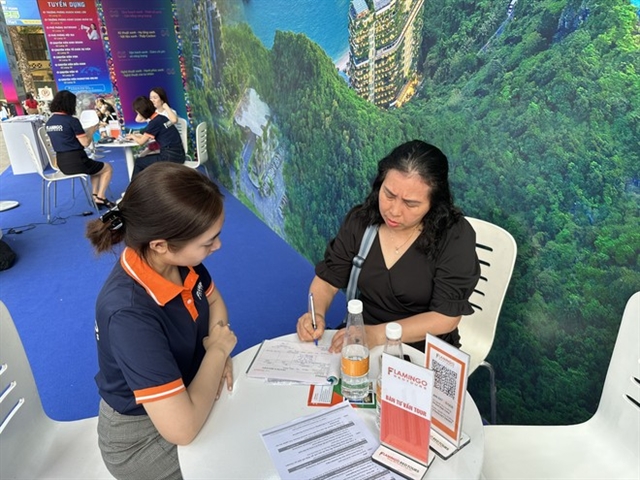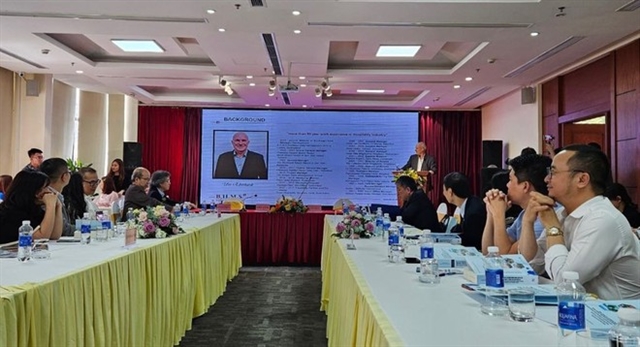 Society
Society


|
| Staff from Flamengo Redtour advise tourists at their booth during the Hà Nội International Tourism Fair 2024. Photo anninhthudo.vn |
HÀ NỘI Within the framework of the ongoing Việt Nam International Travel Mart (VITM) in Hà Nội, discussions on training and enhancing high-quality human resources have been brought up at the international workshop titled "Training and Utilising International Standard Tourism Human Resources in the Current Period".
Limitations affecting human resources
A recent report from the Tourism Development Research Institute highlights the concerning disparity in labour productivity within Việt Nam's tourism and hotel industry. Shockingly, labour productivity in Vietnamese hotels pales in comparison to that of neighbouring countries, standing at just a fraction of Singapore, Japan, and Malaysia's figures.
The influx of foreign workers poses a looming threat to local tourism workers in Việt Nam. With countries like Thailand, the Philippines, and Malaysia competing fiercely, many Vietnamese workers find themselves displaced. In fact, foreign workers, particularly from the Philippines, Thailand, Indonesia, and Singapore, dominate the staff of numerous four and five-star hotels across Việt Nam.
Despite being a key player in the region's tourism scene, Việt Nam struggles with the overall quality of its tourism services, especially in major tourist hubs. The shortage of skilled and adequately trained tourism personnel significantly impacts service standards, hindering the country's tourism potential.
Recognising the critical role of a skilled workforce in enhancing tourism competitiveness, Việt Nam urgently needs a comprehensive human resource development strategy. Such a strategy is vital for upholding service standards and preserving the country's tourism brand amid increasing international competition.
The ASEAN Mutual Recognition Arrangement on Tourism Skills Standards opens doors for labour mobility within the ASEAN bloc, allowing Vietnamese workers to seek opportunities abroad while attracting skilled professionals to fill crucial roles at home. This mutual exchange could bridge the gap in Việt Nam's tourism workforce, addressing skill shortages and bolstering industry competitiveness.
Phạm Văn Thủy, deputy director of the Việt Nam National Administration of Tourism, acknowledges the commendable traits of Vietnamese workers, such as diligence and eagerness to learn. However, he stresses the urgent need for synchronised, systematic, and standardised training to harness their potential effectively. Thủy emphasises the necessity of aligning training with industry needs to cultivate a workforce capable of meeting the demands of Việt Nam's evolving tourism landscape.

|
| The international seminar on "Training and Utilising International Standard Tourism Human Resources in the Current Period" took place on April 12. Photo anninhthudo.vn |
Higher standards needed
Phạm Trung Lương, president of the Việt Nam Tourism Training Association, underscores the urgency of reforming the training policy framework. He advocates for measures such as attracting qualified lecturers from prestigious educational institutions worldwide, enhancing professional qualifications, and integrating teaching with research activities. Lương stresses the importance of a non-discriminatory approach towards educational institutions to foster inclusive growth.
Lương points out the lack of innovation in the current training model, which remains outdated and bureaucratic, failing to align with market demand and global advancements. He calls for a paradigm shift towards a more dynamic and forward-thinking approach to training.
Analysing the weaknesses in tourism workforce training, Dương Đức Thắng, head of the Tourism Department (Đông Á University of Technology) also believes that traditional training methods are no longer suitable for the increasingly high standards and demands of the tourism industry.
"At present, tourism personnel not only need to be proficient in foreign languages but also proficient in technology, have skills to develop products according to high-quality standards. However, many tourism students trained in tourism departments upon graduation are not even competitive with foreign language students due to poor communication skills with foreigners. This is a sad reality," said Thắng.
At the workshop, experts also raised the issue of needing specific standards for international-standard tourism workforce training so that educational institutions can develop suitable training methods.
Phạm Hồng Long, dean of the Tourism Department at the University of Social Sciences and Humanities, Việt Nam National University, suggests that Việt Nam adopt international training accreditation regulations, such as those endorsed by the network of universities in Asia and Europe, to align with global standards.
"It is impossible for 100 per cent of graduates to work in their field after graduation, and only about 20-25 per cent are engaged in the profession, while the rest switch to other careers. There must be truly passionate professionals to improve the quality of training according to international standards. We suggest that management agencies orient the tourism profession according to specific standards, so that schools can build quality training models," said Long.
Proposing solutions to improve the quality of human resources amidst many difficulties, Nguyễn Văn Lưu, former official of the Việt Nam National Tourism Administration, calls for a restructuring of the human resource development network, particularly in tourism education institutions. Lưu advocates for diversifying facilities to nurture Việt Nam's tourism talent amidst prevailing challenges. VNS